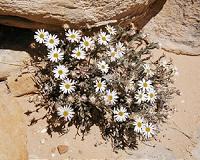 |
Madrid, Spain (SPX) Jan 20, 2011 Only five species of these so-called 'flea' beetles, out of a global total of 60, had been found to date in New Caledonia, in the western Pacific. A three-year study has now enabled Spanish researchers to discover two new herbivorous beetles - Arsipoda geographica and Arsipoda rostrata. These new beetles hold a secret - they feed on plants that the scientists have still not found on the archipelago. "The study, financed by the National Geographic, went some way beyond merely classifying species, and investigated the ecology of these herbivorous insects with a prodigious leaping capacity, which they use to avoid their predators", Jesus Gomez-Zurita, lead author of the study and a researcher at the Institute of Evolutionary Biology (CSIC-UPF) who is passionate about New Caledonia and collected hundreds of beetles in order to study them, tells SINC. The researchers, from Spain and New Caledonia, used previously-developed molecular tools in order to classify the DNA sequences of the animals' diet, in particular chloroplast DNA (which is exclusive to plants). The team used plant matter remains found in the digestive tract of the insects at the time they were killed in order to extract their DNA at the same time. According to the study, which has been published in the Journal of Natural History, this technique made it possible to discover that one of the new species, Arsipoda geographica, which measures three millimetres, feeds on a tropical plant in the mountains (Myrsinaceae), while Arsipoda isola, which is the same size, feeds on another plant (Ericaceae) in the southern jungles of the island. "The strangest thing is that the DNA sequences of the plants are from botanical species that have still not been found on the archipelago. This provides indirect evidence of the existence of an enigmatic botanical diversity, which should be more than expected on an island with a wealth of lush vegetation", says the researcher, who has been studying beetles for 20 years. The study, which is the first in this research line focusing on the Chrysomelidae family (known as 'leaf beetles' because they feed primarily on plants), made it possible to collect more than 2,000 beetle samples on the island of Grande Terre, compare them with other species, and carry out a phylogenetic analysis. So far, three new species have been found, two of which are described here.
New Caledonia, a still unknown territory The numerous insects and beetles on the archipelago, are great number of which are endemic, "are the great unknowns of this biota", says the biologist. "This study of their diversity and similarities without any doubt holds the keys to understanding the evolution of life in this part of the world", he adds. The isolation of New Caledonia in the western Pacific, which became separated from Australia 70 million years ago, has led to "the evolution of some very unusual biotas that have not had any contact with the rest of the world for enormous period of time", the scientist explains.
Share This Article With Planet Earth
Related Links FECYT - Spanish Foundation for Science and Technology Darwin Today At TerraDaily.com
 US plucks tiny daisy from brink of extinction
US plucks tiny daisy from brink of extinctionWashington (AFP) Jan 19, 2011 The tiny Maguire daisy, which grows in the desert southwest of the United States, has been plucked from the edge of extinction after a 25-year conservation effort, US officials have announced. The minuscule member of the sunflower family had dropped to just seven known plants when it was listed as endangered in 1985, but with numbers of the daisy now back up to 163,000 plants in 10 populatio ... read more |
|
| The content herein, unless otherwise known to be public domain, are Copyright 1995-2010 - SpaceDaily. AFP and UPI Wire Stories are copyright Agence France-Presse and United Press International. ESA Portal Reports are copyright European Space Agency. All NASA sourced material is public domain. Additional copyrights may apply in whole or part to other bona fide parties. Advertising does not imply endorsement,agreement or approval of any opinions, statements or information provided by SpaceDaily on any Web page published or hosted by SpaceDaily. Privacy Statement |